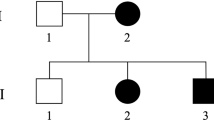Abstract
Mutations in the SPG3A gene cause a form of pure, early–onset autosomal dominant hereditary spastic paraplegia linked to chromosome 14q. The encoded protein, atlastin, is a putative member of the dynamin superfamily of large GTPases involved in cellular trafficking patterns. We report a new atlastin mutation causing spastic paraplegia in association with axonal neuropathy in an Italian family.
Similar content being viewed by others
References
Dalpozzo F, Rossetto MG, Boaretto F, et al. (2003) Infancy onset hereditary spastic paraplegia associated with a novel atlastin mutation. Neurology 61:580–581
LaMonte BH, Wallace KE, Holloway BA, et al. (2002) Disruption of dynein/ dynactin inhibits axonal transport in motor neurons causing late-onset progressive degeneration. Neuron 34:715–727
Mc Niven MA, Hong C, Pitts KR, et al. (2000) The dynamin family of mechanoenzymes: pinching in new places. TIBS 25:115–120
Muglia M, Magariello A, Nicoletti G, et al. (2002) Further evidence that SPG3A gene mutations cause autosomal dominant hereditary spastic paraplegia. Ann Neurol 51:794–795
Reid E, Kloos M, Ashley-Koch A, et al. (2002) A kinesin heavy chain (KIF5A) mutation in hereditary spastic paraplegia (SPG10). Am J Hum Genet 71:1189–1194
Sauter SM, Engel W, Neumann LM, et al. (2004) Novel mutations in the Atlastin gene (SPG3A) in families with autosomal dominant hereditary spastic paraplegia and evidence for late onset forms of HSP linked to the SPG3A locus. Hum Mutat 23:98–104
Tessa A, Casali C, Damiano M, et al. (2002) SPG3A: an additional family carrying a new atlastin mutation. Neurology 59:2002–2005
Zhao X, Alvarado D, Rainier S, et al. (2001) Mutations in a newly identified GTPase gene cause autosomal dominant hereditary spastic paraplegia. Nat Genet 29:326–331
Zhao C, Takita J, Tanaka Y, et al. (2001) Charcot-Marie-Tooth disease type 2A caused by mutation in a microtubule motor KIF1Bbeta. Cell 105:587–597
Zhu P, Patterson A, Lavoie B, et al. (2003) Cellular localization, oligomerization and membrane association of the hereditary spastic paraplegia 3A (SPG3A) protein Atlastin. J Biol Chem 278:49063–49071
Author information
Authors and Affiliations
Corresponding author
Rights and permissions
About this article
Cite this article
Scarano, V., Mancini, P., Criscuolo, C. et al. The R495W mutation in SPG3A causes spastic paraplegia associated with axonal neuropathy. J Neurol 252, 901–903 (2005). https://doi.org/10.1007/s00415-005-0768-1
Received:
Revised:
Accepted:
Published:
Issue Date:
DOI: https://doi.org/10.1007/s00415-005-0768-1




